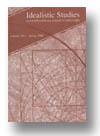|
articles |
|
1.
|
Idealistic Studies:
Volume >
36 >
Issue: 2
Brian O’Connor
A Missing Step In Kant’s Refutation of Idealism
abstract |
view |
rights & permissions
| cited by
This paper contends that Kant’s argument in the Refutation of Idealism section of the Critique of Pure Reason misses a step which allows Kant to move illicitly from inner experience to outer objects. The argument for persistent outer objects does not comprehensively address the skeptic’s doubts as it leaves room for the question about the necessary connection between representations and outer objects. A second fundamental issue is the ability of transcendental idealism to deliver the account of outer objects, as required by the Refutation of Idealism itself.
|
|
|
|
|
2.
|
Idealistic Studies:
Volume >
36 >
Issue: 2
Jason C. Robinson
Timeless Temporality:
Gadamer’s Discontinuous Historical Awareness
abstract |
view |
rights & permissions
| cited by
This article explores Gadamer’s description of time(s) and situates it within his aesthetic account and hermeneutics. Bringing together all of Gadamer’s major discussions on time, I develop a consistent account which I then challenge. Whereas Heidegger famously describes transcendental temporality with an emphasis on futurity, Gadamer accentuates a historical temporal awareness and itsdiscontinuous nature. Gadamer’s notion of time is best understood, paradoxically, as a timeless temporality, when time is defined as the sequential movement along discrete points. I argue that Gadamer’s unique description of temporality, which has been largely ignored by scholars, is essential to his understanding of experience and, therefore, to our understanding of his philosophical hermeneutics.
|
|
|
|
|
3.
|
Idealistic Studies:
Volume >
36 >
Issue: 2
Michael Futch
Leibniz on Time and Substance
abstract |
view |
rights & permissions
| cited by
Leibniz’s metaphysics is centered on the claim that ultimate reality is composed of mind-like, immaterial substances, monads. While it is universally agreed that such substances are non-spatial, monads’ relation to time is less clear. In some passages, Leibniz suggests that monads are themselves temporal, yet in others he implies that they have only derived temporal properties in virtue of being connected to phenomenal bodies. This has led to predictable disagreements among commentators, some insisting that monads are intrinsically temporal and some insisting that they are intrinsically non-temporal. In this article, I seek to defend the latter interpretation. To do this, I focus on Leibniz’s account of monadic perception and appetition, arguing that the order of monadic states is given by the intentional content represented therein. This view, I suggest, commits Leibniz to the conclusion that monads are intrinsically non-temporal, having only second-order, derivative temporal properties.
|
|
|
|
|
4.
|
Idealistic Studies:
Volume >
36 >
Issue: 2
Nectarios G. Limnatis
The Canon and the Organon of Thought:
Formal Logic and Contradiction In Kant’s Theoretical Philosophy
abstract |
view |
rights & permissions
| cited by
This paper looks at the Kantian background in the development of the views on formal logic and contradiction in German Idealism. Assuming the post-Kantian view, I examine what Kant advanced and what he left unsettled, provoking thus the subsequent debate. I start by showing (§1) that already the pre-critical Kant questions the effectiveness of formal logic in philosophical discourse andclaims that the laws of identity and non-contradiction fall short of explaining change, opposition, and contradiction, all these being parts of reality. Turning then to the first Critique, I discuss (§2) the introduction of transcendental logic as the (meta)logic of truth, consider how the tension between formal and transcendental logic is displayed in Kant’s exposition of the antinomy of pure reason (§3), and arrive at the conclusion (§4) that Kant, despite his criticism, and unlike the other great German Idealists, allows formal logic to dominate his exposition of transcendental logic.
|
|
|
|
|
5.
|
Idealistic Studies:
Volume >
36 >
Issue: 2
Ian Duckles
A (Partial) Defense of MacIntyre’s Reading of Kierkegaard
abstract |
view |
rights & permissions
| cited by
Among Kierkegaard scholars, there is a great deal of concern regarding how to deal with Alasdair MacIntyre’s treatment of Kierkegaard in his seminal work After Virtue. In this essay, I attempt to defend MacIntyre’s claim that the choice articulated in Kierkegaard’s Either/Or is irrational through a close reading of an essay from a later work by Kierkegaard, Stages on Life’s Way. In so doing, I argue that though MacIntyre’s interpretation of the position articulated in Either/Or is essentially correct, he is mistaken to attribute that position, articulated by a pseudonym, to Kierkegaard. Instead, I argue that Kierkegaard should be seen as strategically employing that position to level a criticism against a certain rationalist tradition in ethics embodied by fi gures as diverse as Kant, Rousseau, and Diderot.
|
|
|
|
